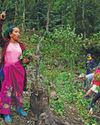
JAMUN, THE Indian black plum, has an intrinsic relation with the monsoon. The seed-sized fruit, also known as Malabar plum or Syzygium cumini, waits until the arrival of the season to acquire that deep purple hue and grow sweeter and luscious. Then, with the first few showers of monsoon, it starts dropping, at times from a height of 11 m, as if to paint the surroundings and to accentuate the smell of wet earth. A remarkable aspect of jamun is that the fruit, though available only around the onset of the monsoon, contains antimicrobial compounds that can boost immunity at a time when infections, especially of the stomach, are common.
Its pulp comes loaded with vitamins and mineral nutrients, such as sodium, potassium, calcium, phosphorous, iron and zinc; water-soluble vitamins like ascorbic acid, thiamine and niacin; and even amino acids like alanine, asparagine, tyrosine, glutamine and cysteine, according to a 2014 review paper by researchers from the Department of Agricultural and Food Engineering at the Indian Institute of Technology, Kharagpur.
The fruit also contains flavonoids and other compounds like jambosine and jambolin that have hypoglycemic propertiesmeaning, these compounds can halt the conversion of starch into sugar. This is the reason jamun is popular among those with diabetes. Even in the Siddha, Ayurveda and Unani systems of medicine the fruit is prescribed for patients with diabetes. Since jamun is seasonal, diabetes patients also depend on the powder made from its seeds for deriving the health benefits.
This story is from the {{IssueName}} edition of {{MagazineName}}.
Start your 7-day Magzter GOLD free trial to access thousands of curated premium stories, and 9,000+ magazines and newspapers.
Already a subscriber ? Sign In
This story is from the {{IssueName}} edition of {{MagazineName}}.
Start your 7-day Magzter GOLD free trial to access thousands of curated premium stories, and 9,000+ magazines and newspapers.
Already a subscriber? Sign In

On shaky ground
Despite reporting net gains in green cover, the latest forest survey shows degradation of natural forests, particularly in ecologically sensitive hotspots

Burden of proof
The government's drive for e-KYC verification to ensure rightful targeting of beneficiaries has proved exclusionary for many

Rupee slide impacts agricultural trade
THE UNION Cabinet on January 1, 2025, approved the extension of a subsidy package of ₹3,500 per tonne on di-ammonium phosphate (DAP) for companies.

THE 500 GW SWITCH OVER
Coal is the king of energy at present. India needs to dislodge it with clean energy for an equitable green transition

MANIFESTING 500 GW
Ensure that renewable energy is available round the clock.Establish a viable market and reward those who take lead

Lifting a curse
How Gangabai Rajput helped her water-scarce village in Madhya Pradesh let go of superstition and revive an ancient waterbody

HOLD THEM SACRED
The Supreme Court has recommended that the Union government create a comprehensive policy for the governance and management of sacred groves across the country

REPORT CARD 2024
Coal is still the king in terms of electricity generation. But new renewables, mainly solar power, have shown an impressive growth

'India a laboratory for seismologists'
India is no stranger to earthquakes. In recent memory, Latur and Bhuj districts in Maharashtra and Gujarat witnessed devastating tremors in 2003 and 2001 respectively. Such quakes leave clues that can aid preparations for future events, say seismologists KUSALA RAJENDRAN, professor, Indian Institute of Science, and CP RAJENDRAN, adjunct professor, National Institute of Advanced Studies. The Rumbling Earth-The Story of Indian Earthquakes, captures their work on historical as well as recent quakes. In an interview with ROHINI KRISHNAMURTHY, they discuss the science of earthquakes, why the Himalayas are due for a huge event and why prediction remains a challenge. Excerpts:

Capturing Siang
As India pushes for a mega-dam on the Siang river to counter China's upstream projects, the Adi tribal community of Arunachal Pradesh fears losing ancestral land